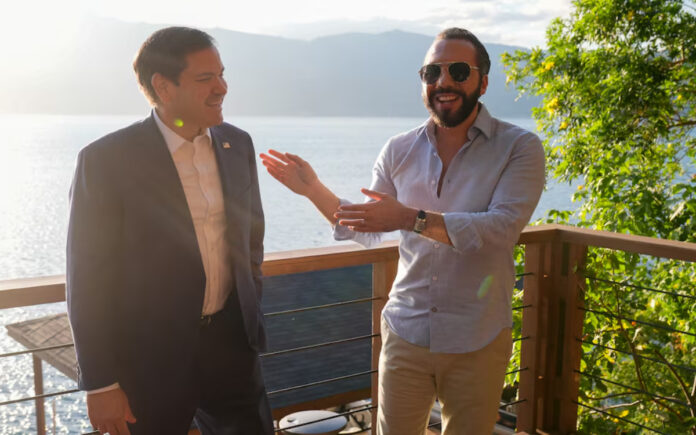San Salvador: El Salvador has proposed housing “dangerous criminals” deported from the United States, U.S. Secretary of State Marco Rubio announced following extended discussions with Salvadoran President Nayib Bukele. The offer is part of ongoing talks between Washington and Central American nations as the Trump administration pushes forward with its large-scale deportation plans.
Rubio, currently on his first overseas tour as the U.S. Secretary of State, met with Bukele and senior officials at the Salvadoran president’s residence on Lake Coatepeque for nearly three hours. Their discussion resulted in an agreement that expands beyond El Salvador’s acceptance of its own deported nationals.
El Salvador’s Offer
“Any … illegal immigrant in the United States who’s a dangerous criminal—MS-13, Tren de Aragua, whatever it may be—he has offered his jails, so we can send them and he will put them in his jails,” Rubio stated, referring to members of violent criminal organizations.
Bukele also extended the offer to house dangerous criminals who are U.S. citizens or legal residents. However, Rubio did not confirm whether Washington would accept that part of the proposal, emphasizing that more details would be released in due course. Legally, U.S. citizens cannot be deported from the United States.
The move aligns with the Trump administration’s efforts to negotiate “third country” agreements, where nations agree to accept deportees from other countries that refuse to take them back. For example, both Cuba and Venezuela have previously limited the number of deportees they accept from the U.S. However, according to Trump, Venezuelan President Nicolás Maduro has now agreed to receive repatriated Venezuelan nationals.
El Salvador’s Prison System and U.S. Response
Bukele took to social media to elaborate on his proposal, stating that he had offered the U.S. “the opportunity to outsource part of its prison system.”
“We are willing to take in only convicted criminals (including convicted U.S. citizens) into our mega-prison… in exchange for a fee,” he posted on X, referring to El Salvador’s high-security “terrorism confinement center.”
According to Bukele, this fee would be relatively low for the U.S. but would significantly contribute to sustaining El Salvador’s prison system.
Also Read | Mexico’s Sheinbaum Faces First Major Foreign Policy Test Over Trump Tariffs
However, human rights organizations and international watchdogs have raised concerns over the conditions in Salvadoran prisons. The U.S. State Department describes prison conditions in the country as “harsh and dangerous,” citing extreme overcrowding, lack of potable water, poor sanitation, and inadequate ventilation.
A Key Ally in U.S. Migration Policy
Bukele’s administration has been viewed by Washington as a strategic partner in addressing migration challenges in the region. His aggressive security policies, which have led to the arrest of over 80,000 people and a drastic reduction in homicide rates, have contributed to a decline in Salvadorans attempting to enter the U.S. illegally.
Since assuming office on January 20, President Donald Trump has intensified deportations to Latin America, including the use of military aircraft for repatriation flights. On Monday, the Trump administration also announced the removal of deportation protections for hundreds of thousands of Venezuelans in the U.S.
Also Read | Trump Administration Moves to Curb Antisemitism in Higher Education
Additionally, Trump recently revealed plans to expand the detention facility at the U.S. naval base in Guantanamo Bay, Cuba, aiming to house up to 30,000 people.



